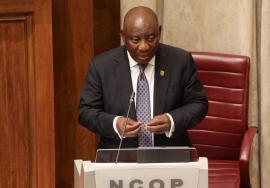Amidst the global economy facing heightened uncertainty and complex challenges, the Deputy Minister of Finance, Dr David Masondo, has emphasised the importance of fair trade.
The global economy is experiencing ongoing wars and conflicts, geopolitical and trade tensions, disruptions to global supply chains, high debt levels, and frequent extreme weather events and natural disasters, which affect economic growth, financial and price stability.
To address the existing and emerging risks to the global economy, the Group of Twenty (G20) Finance Ministers and Central Bank Governors (FMCBG) meeting that was held in Durban this week, pledged to strengthen multilateral cooperation to address existing and emerging risks to the global economy.
The meeting also recognised the importance of the World Trade Organisation (WTO) to advance trade issues and the agreed-upon rules in the WTO as an integral part of the global trading system.
It also recognised that the WTO has challenges and needs meaningful, necessary, and comprehensive reform to improve all its functions, through innovative approaches in order to be more relevant and responsive in light of today’s realities.
“We are living in a globalised economy. Multinational companies are producing in different sovereigns in geographic spaces and as they produce you don’t want them to find it difficult to have access to markets.
“If it is difficult for them to get access to the market, they are not going to realise profits and they won’t reinvest into the growth of the economy. This meeting emphasised that it [is]important for us to be a rules-based world. It’s important for us to run our global economy through multilateral platforms,” the Deputy Minister said on Friday at a media briefing held at the conclusion of the FMCBG.
WATCH | Closing media briefing
The Ministers and Governors agreed to bolster long-term growth potential by pursuing growth-oriented macroeconomic policies, while building fiscal buffers, ensuring fiscal sustainability, encouraging public and private investments, undertaking productivity-enhancing reforms and safeguarding central bank independence to maintain price stability.
“Structural reforms are essential for generating strong economic growth and creating more and better jobs.
“All excessive imbalances should be further analysed by the International Monetary Fund (IMF) and, if necessary and, without discrimination, addressed through country-specific reforms and multilateral coordination, in a way that contributes to an open global economy and without compromising sustainable global growth,” the FMCBG communique said.
Central banks affirmed a strong committed to ensuring price stability, consistent with their respective mandates and will continue to adjust their policies in a data-dependent manner.
“Central bank independence is crucial to achieving this goal,” the communique said.
Meanwhile, members of the G20 have pledged to address the mounting debt pressures in low and middle-income economies amid global financial turbulence.
READ | G20 members commit to addressing debt vulnerabilities
This as developing and emerging economies – particularly those in Africa – are grappling with high and rising debt vulnerabilities, shrinking fiscal flexibility and high borrowing costs.
–SAnews.gov.za














